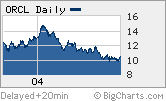NEW YORK (CNN/Money) -
Oracle, one of the world's largest software developers, reported fiscal first quarter earnings that were better than expected and sales that matched Wall Street forecasts Tuesday.
Investors initially cheered the news after hours, sending the stock up nearly 5 percent at one point.
But the stock gave up some of these gains once Oracle issued uninspiring sales guidance for the second quarter during a conference call with analysts, raising concerns about how strong software sales will be in the last few months of the year.
The Redwood Shores, Calif.-based company reported net income of $509 million, or 10 cents a share, a 16 percent increase from the $440 million, or 8 cents a share, Oracle earned in the same period a year ago. Analysts were expecting Oracle to report earnings of 9 cents a share.
Revenues came in at $2.2 billion, up 7 percent from $2.07 billion a year ago and meeting Wall Street's consensus forecast.
Sales of new software licenses, a closely watched measure of near-term demand, were $563 million, up 7 percent from a year ago and in line with what many analysts were expecting. The company said in June that new license growth for the quarter would be in the range of 5 percent to 15 percent.
The remainder of Oracle's sales come from license updates and support as well as services. Updates and support revenue increased 14 percent from a year ago while services sales fell 7 percent.
Street frets 2Q guidance
Shares of Oracle (ORCL: Research, Estimates) were up more than 3.5 percent after hours, according to INET, after closing slightly lower in regular trading on the Nasdaq Tuesday. The stock has fallen nearly 20 percent this year due to fears about sluggish demand for so-called enterprise software to large corporations.
Wall Street at first seemed to be pleased that Oracle did not wind up missing sales estimates, as some analysts had feared it would.
 |
|
| Oracle has been hit due to concerns about softening software demand. |
"These are pretty decent numbers given where expectations were for the company," said Brendan Barnicle, an analyst with Pacific Crest Securities.
In particular, the company's new license sales gains were led by another strong quarter from Oracle's flagship database software division, which accounted for nearly 90 percent of total new license revenue. Database licenses increased 18 percent from a year ago.
During a conference call with analysts, chief financial officer Harry You said that the company's latest results showed that Oracle has been able to endure what appeared to be "a lull in the economy." He added that in this environment, the software industry is "seeing the strong get stronger and the weak get weaker."
But You added that a strong dollar would hurt sales going forward as Oracle derives more than half of its total revenue from outside the Americas. He also said that while the U.S. economy was slowly improving, this recovery may pause in the coming months due to concerns about the presidential election and oil prices.
As a result, You said that sales for the second quarter, ending in November, should be between $2.58 billion and $2.66 billion. Wall Street's consensus estimate was $2.66 billion. What's more, You said that new license sales for the quarter would be in a range of down 2 percent from the same period last year to up 8 percent.
You said that Oracle was comfortable with Wall Street's earnings projection of 13 cents a share. Oracle earned 12 cents a share in last year's second quarter.
Oracle chairman Jeff Henley added during the call that the economy was not getting worse but that customers were more cautious now than they were a few months ago.
PeopleSoft battle still taking its toll
Investors appeared to be shrugging off another disappointing performance by Oracle's application business, however. This division, which includes sales of software that helps big businesses automate daily corporate tasks, reported a 36 percent decline in new license sales from last year.
| More about software
|

|
|
|
|
One analyst who asked not to be named said he was surprised that investors were so excited about Oracle's results given the huge drop in application software sales. The analyst added that the main reason Oracle appeared to surpass Wall Street's earnings targets was because of cost controls, not a major pickup in sales.
In fact, Oracle is hoping to boost its top line growth prospects in the lucrative application market through acquisitions. The company launched a hostile bid for rival application software firm PeopleSoft in June 2003.
PeopleSoft has rejected four offers from Oracle but many on Wall Street think the company may now have no choice but to sell out after a federal district judge ruled last week that Oracle could go ahead with its plans to buy PeopleSoft.
The U.S. Department of Justice had sued to block the deal on antitrust grounds. The European Union's Competition Commission has yet to issue its own ruling on the proposed takeover.
During the call, You said that Oracle was not pleased with its results in the application business but that the company expected to report increased license revenues in coming quarters.
But Barnicle said that Oracle's poor application sales clearly illustrate a need for consolidation in this crowded software market since companies are resorting to aggressive pricing to win business at a time when corporate customers are wary of spending a lot on new software due to the slowing economy.
He added that the ongoing takeover drama is taking its toll on both Oracle and PeopleSoft and that this is helping application industry leader SAP.
"Pricing pressure is killing the application software companies and that's the reason for weakness," said Barnicle. "And we have definitely heard from customers that they are unwilling to buy from either Oracle or PeopleSoft until the takeover situation is resolved."

|

